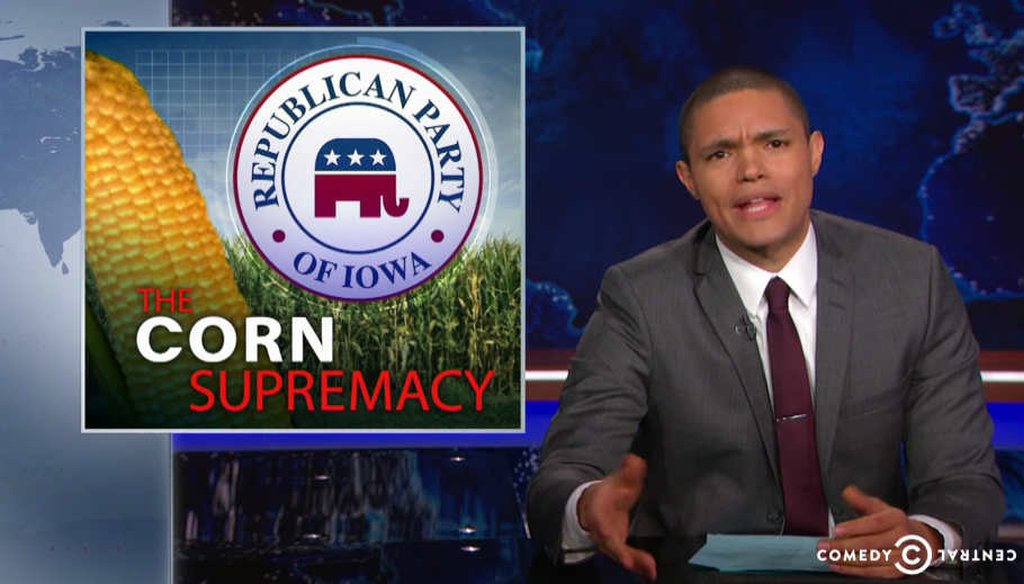

Our only agenda is to publish the truth so you can be an informed participant in democracy.
We need your help.


"Daily Show" host Trevor Noah said the Iowa GOP caucuses no longer matter. (Screengrab)
Iowa Republicans might have had good reason to stiff The Daily Show, but the move drew a predictable reaction. The party turned down the program’s request to cover a major gathering of the presidential contenders saying they thought the program would come only to make fun of their state. New host Trevor Noah was miffed.
"Our problem isn't with Iowa as a state, it's with its bloated role in the American elections," Noah said. "I don't understand, especially because Iowa's Republican caucus stopped mattering years ago. It in no way determines the party nominee, let alone the general election winners. Ask Mike Huckabee and even less-President Rick Santorum."
We thought we’d look into Noah’s assertion that Iowa’s GOP caucus no longer matters and that it "in no way determines the party nominee."
Strictly by the numbers, Iowa’s Republicans don’t have a great track record of picking the ultimate nominee. There have been seven contested caucuses since the party held its first one in 1976. Out of that, the party’s voters can boast three hits and four misses. In baseball, they’d be a valuable .400-plus hitter. But in politics, not so much.
"At best, Iowa Republicans have a mediocre record of picking the eventual nominee in the caucuses," said Peverill Squire, a political scientist at the University of Missouri. "The Iowa caucuses, particularly on the GOP side, matter less in 2016 than they did a decade or two ago."
This table shows how both the Republican and Democratic caucuses have performed over the years. Green means success.
Democrats have a better batting average, but a few details for contests in both parties bear noting.
In 1972, the Democrats held the first caucus and it barely registered on the political scene. South Dakota Sen. George McGovern, the eventual nominee, campaigned for all of about two days in the state. In 1976, the category of Uncommitted was allowed and while Georgia Gov. Jimmy Carter came out on top with 28 percent, Uncommitted took 37 percent.
In 2012, former Pennsylvania Sen. Rick Santorum got the most votes, but out of nearly 60,000 votes cast between him and Mitt Romney, his margin of victory was a microscopic 34 votes. (The race was so close that the Iowa GOP initially called the caucuses for Romney.)
Romney went on to take the nomination. So Iowa Republicans didn’t pick the ultimate winner, but they came incredibly close.
Where does this leave us?
If you measure the Republican Iowa caucus against who gets the nomination, it does poorly. But political scientist Dennis Goldford at Drake University in Iowa said that’s a false premise. Goldford said he doesn’t know any serious observer who expects that out of Iowa.
"It’s more likely to tell you who won’t be the president, or who won’t be the nominee," he said.
Squire echoed that view.
"The traditional role of the caucuses in both parties has really been to winnow the field," he said.
Goldford said the significance of the caucuses stems entirely from Iowa being the very first step in the nomination process. Under new rules, candidates will gain delegates to the nominating convention. But the impact goes beyond delegates at a convention.
"What they do is reveal unexpected strengths and weaknesses among the candidates," he said.
A second-place finish for a candidate thought to be a dark horse can be seen as a win. The same result for a front runner is seen as a loss, with potential repercussions in the primaries that follow.
Squire reminded us that Iowa is important in another way.
With only one exception, one of the top three finishers in Iowa has gone on to become the Republican nominee. From this comes the old saw -- there are three tickets out of Iowa.
In 1980, Ronald Reagan came in second. George Bush took third in 1988, and in 2012, Romney was second by a whisker. The outlier is John McCain in 2008. He came in fourth but in an historic recovery, became the Republican nominee.
Squire argued that shaping the field, rather than being a King-maker, is healthier for the democratic process.
Our ruling
Noah said that the Republican Iowa caucuses "stopped mattering years ago" and "in no way determines the party nominee." Noah has a point about the track record of the GOP caucus picking the eventual nominee, but he pushes it too far when he says they have no impact on the nomination process. Generally, winning or doing reasonably well in Iowa puts a candidate on the path to the nomination.
We rate this claim Half True.
Update: This post has been updated to note that the Iowa GOP initially called Romney the winner in 2012.
Comedy Central, The Daily Show, Nov. 3, 2015
Des Moines Register, Caucus history: Past years’ results
Des Moines Register, 2012 Caucus results
Iowa Public Television, History of the Iowa Caucus
Berkeley Electronic Press, The Iowa Caucuses, 1972-2008: A Eulogy, 2008
Email interview, Peverill Squire, professor of political science, University of Missouri, Nov. 4, 2015
Interview, Dennis Goldford, professor of political science, Drake University, Nov. 4, 2015
In a world of wild talk and fake news, help us stand up for the facts.
